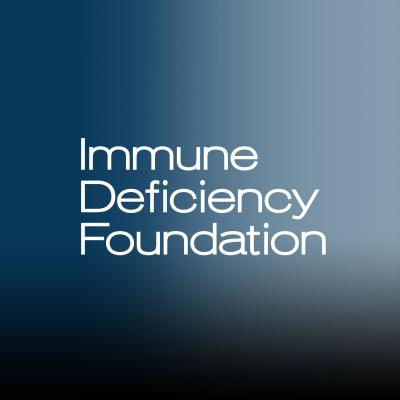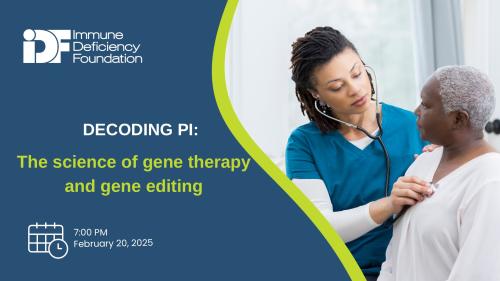
-
Understanding primary immunodeficiency (PI)

Understanding PI
The more you understand about primary immunodeficiency (PI), the better you can live with the disease or support others in your life with PI. Learn more about PI, including the various diagnoses and treatment options.
-
Living with PI
-
Addressing mental health
-
Explaining your diagnosis
- General care
- Get support
- For parents and guardians
-
Managing workplace issues
- Navigating insurance
-
Traveling safely

Living with PI
Living with primary immunodeficiency (PI) can be challenging, but you’re not alone—many people with PI lead full and active lives. With the right support and resources, you can, too.
-
Addressing mental health
-
Get involved

Get involved
Be a hero for those with PI. Change lives by promoting primary immunodeficiency (PI) awareness and taking action in your community through advocacy, donating, volunteering, or fundraising.
-
Advancing research and clinical care
-
Grants
-
IDF surveys
-
Participating in clinical trials
-
Diagnosing PI
-
Consulting immunologist
-
Clinician education

Advancing research and clinical care
Whether you’re a clinician, researcher, or an individual with primary immunodeficiency (PI), IDF has resources to help you advance the field. Get details on surveys, grants, and clinical trials.
-
Grants
ADA-SCID gene therapy trials to resume in 2023
Parents of children with adenosine deaminase (ADA) deficient severe combined immunodeficiency (SCID) learned that after several years of delay, clinical trials to treat ADA-SCID using gene therapy will resume in 2023.
Dr. Donald Kohn, University of California Los Angeles (UCLA) Department of Microbiology, Immunology, and Molecular Genetics distinguished professor and lead investigator on the trials, shared the news at an Immune Deficiency Foundation (IDF) SCID Compass Lunch & Learn in September.
The gene therapy clinical trials stalled in 2018, two years after Orchard Therapeutics licensed the treatment from UCLA with the intention of making it commercially available. Orchard failed to make progress in gaining Food and Drug Administration (FDA) approval for the treatment and for financial reasons decided not to make the investment necessary to continue with its development.
In May 2021, under pressure from parents whose children with ADA-SCID need gene therapy treatment, Orchard transferred the license back to UCLA. UCLA immediately resumed work on the trials but hit a roadblock in the spring of 2022 when the FDA requested amendments to the newly developed UCLA clinical protocol and manufacturing plans before allowing the clinical trials to move forward.
The extra work required by UCLA to meet the FDA demands took about six months and in September 2022 researchers re-submitted the modified protocol and plans. The FDA has 30 days to review it, and Kohn said if all goes well, enrollment in the trial can begin in January 2023, and his team can treat three to six patients within a year.
UCLA intends to move forward on the list of 26 children who have been waiting for treatment by providing treatment to those who’ve been on the list the longest. Three joined the list in 2017, five in 2018, four in 2019, four in 2020, seven in 2021, and three in 2022.
ADA deficiency is the cause of 10 to 15 percent of SCID cases, and about 10 babies are born each year with ADA-SCID across the U.S. and Canada.
Children with ADA-SCID lack an important enzyme called adenosine deaminase (ADA) which helps the body break down a chemical called deoxyadenosine that is toxic to white blood cells. Because the child doesn’t have the enzyme, the toxin builds up, kills white blood cells, including T cells, and causes SCID.
A temporary treatment option is enzyme replacement therapy (ERT). This therapy provides functional ADA enzyme, reducing the build-up of deoxyadenosine and allowing the child to make T cells. ERT is administered through one to two injections per week and is used until a more definitive treatment like bone marrow transplant (BMT) or gene therapy can be given.
Since not all children can find donor cells that closely match their own for BMT and BMT sometimes fails, gene therapy is an important alternative treatment. In gene therapy, doctors withdraw some of a child’s own stem cells, insert a working copy of the ADA gene into the cells, and infuse those cells back into the child where they produce a functioning immune system.
In clinical trials performed by UCLA and Great Ormond Street Hospital in the United Kingdom, from 2013 to 2018, 48 out of 50 children with ADA-SCID who underwent gene therapy developed a functioning immune system. All the children survived, but one didn’t engraft and later received a successful BMT, and another failed to reach sufficient engraftment and returned to ERT.
In the absence of support from Orchard, the California Institute for Regenerative Medicine (CIRM) is funding the clinical trials at UCLA, but eventually, researchers will have to partner with a company to produce the treatment commercially.
Barriers to treating all children on the waiting list include limits on funds, staff time, and vector (vector is a deactivated virus that delivers the corrected gene into a cell during gene therapy). Not enough funds from the current grant exist to treat 26 children and though there is enough vector to treat that number, said Kohn, the vector could lose its potency because it’s a biological material. A new batch of vector costs about $500,000 and takes about a year to obtain.
“Once we are up and going and we see we can treat more patients, we’ll put in another grant to CIRM to get more data to support the FDA application, and in that budget, we would request money to get another batch of vector and ideally would have that before we finish the current one,” said Kohn.
Kohn said after his team successfully treats three to six patients, they’ll move as far as they can with the others, but he cannot guarantee that all children on the list will receive treatment.
“We’ll try and treat as many patients as we can under the compassionate protocol with the limitations I mentioned. I don’t know if we’ll get through 26 patients. That may take two, three, or four years and more vector and more funding but we’ll try,” he said.
Update on gene therapy for ADA-SCID
This update was published on June 15, 2021
A group of parents whose infants and toddlers are diagnosed with ADA-SCID banded together and aided in changing the course of gene therapy treatment for their children.
With support from SCID Angels for Life, the parents urged Orchard Therapeutics, the company supervising the ADA-SCID gene therapy treatment clinical trials, to turn the treatment back over to the university setting because they were dissatisfied with the pace of the trials.
The parents’ advocacy paid off in May when Orchard announced that technical issues and patient preference led them to abandon the development of the gene therapy treatment and that the company would send it back to the University of California Los Angeles (UCLA) and University College of London.
Heather Smith, SCID Angels’ president and founder, and chairperson for both the SCID Compass Steering Committee and the SCID Compass Patient Advisory Board, called the announcement exciting news, and praised the parents for their efforts.
“Families sent an email a few months back with testimonies and photos of their children who are waiting for gene therapy treatment and their desire to see this move forward and I think that’s what really preempted this push,” said Heather.
Gene therapy trials for ADA-SCID stopped a year ago, said Heather, even though babies continued to be born with the condition. Those with ADA-SCID have adenosine deaminase deficiency, resulting in a lack of T and B cells and no immune system function.
Currently, in the U.S., the only approved treatment option for those with ADA-SCID is a bone marrow transplant preferably from a matched sibling donor. Those children who do not have a matched sibling donor use Revcovi, an enzyme replacement therapy, in an effort to try and remain healthy. However, Revcovi is only a stopgap until children can undergo more permanent treatment like bone marrow treatment or gene therapy in clinical trials.
Close to 20 families are waiting to use gene therapy as a treatment for their children with ADA-SCID, according to Heather and other advocates. Knowing that the treatment administration could now move at a faster pace is promising.
“It offers hope, some light at the end of the tunnel,” said Heather.
Though Orchard will no longer supervise the clinical trials, the company will fund efforts to help patients gain access to the treatments. In a letter to SCID Angels outlining his intent to turn the license for the ADA-SCID gene therapy treatment back over to the universities, Dr. Bobby Gaspar of Orchard said the company is committed to supporting a compassionate use program to be set up and administered by both UCLA and Great Ormond Street Hospital in London.
Under the compassionate use program, patients may utilize the gene therapy treatment outside of clinical trials.
Meanwhile, SCID Angels continues to be proactive in support of the families of children with ADA-SCID.
Gene therapy for ADA-SCID shows promise
Originally published May 11, 2021
Research findings recently published in the New England Journal of Medicine provide hope that gene therapy may one day be an accepted treatment for ADA-SCID instead of an experimental one.
Babies born with severe combined immunodeficiency, or SCID, have no immune system and die from infection within the first year or two of life unless they undergo treatment to restore their immune system.
The researchers, funded in part by the National Institutes of Health, found that 48 out of 50 infants and children with ADA-SCID treated with gene therapy experienced a restored immune system within a period of two to three years and did not require additional treatments. The research study took place in both the United States and the United Kingdom.
Children with ADA-SCID lack an important enzyme called adenosine deaminase (ADA), essential for the metabolic function of a variety of cells, especially T cells. The absence of this enzyme leads to an accumulation of toxic metabolic by-products within lymphocytes that cause infection-fighting cells to die.
For these most recent clinical trials, researchers used a modified lentivirus to deliver a corrected copy of the ADA gene into the patient’s stem cells. The virus, or vector, is different from the one researchers used in past gene therapy clinical trials for ADA-SCID. Prior gene therapy trials for ADA-SCID used a gamma retrovirus to transfer the gene into the stem cells, resulting in leukemia in some patients.
“These findings suggest that this experimental gene therapy could serve as a potential treatment option for infants and older children with ADA-SCID,” said Anthony S. Fauci, M.D., director of NIH’s National Institute of Allergy and Infectious Diseases (NIAID).
“Importantly, gene therapy is a one-time procedure that offers patients the hope of developing a completely functional immune system and the chance to live a full, healthy life.”
To learn more about the ADA-SCID gene therapy research and for a more in-depth explanation of the gene therapy process, read this news release from the National Institutes of Health.
Related resources
Sign up for updates from IDF
Receive news and helpful resources to your cell phone or inbox. You can change or cancel your subscription at any time.





The Immune Deficiency Foundation improves the diagnosis, treatment, and quality of life for every person affected by primary immunodeficiency.
We foster a community that is connected, engaged, and empowered through advocacy, education, and research.
Combined Charity Campaign | CFC# 66309




